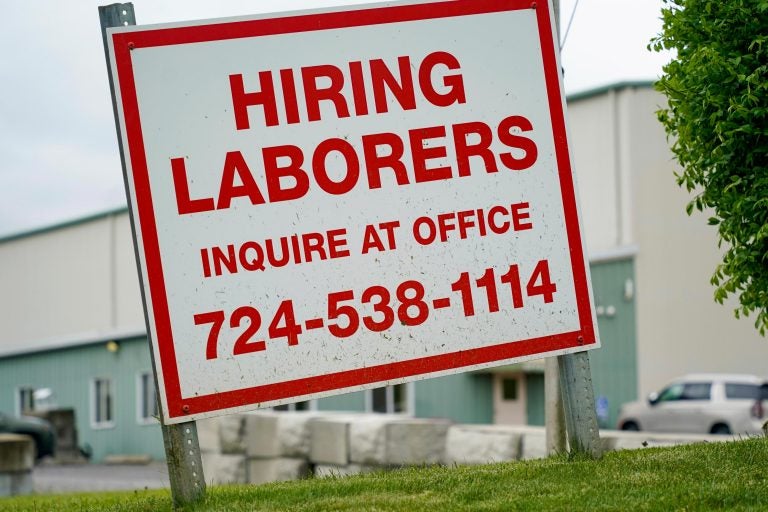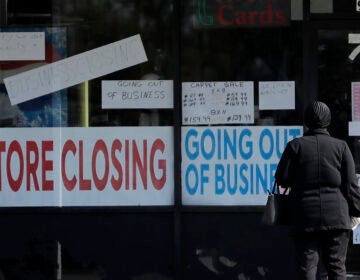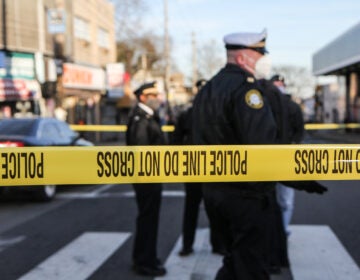Pa. GOP wants to restore work-search rule for jobless benefits
Lawmakers suspended the work-search requirement through 2020 amid the pandemic last year, and Gov. Tom Wolf, a Democrat, extended the waiver administratively into this year.

A sign seeking to hire laborers is posted outside a concrete products company in Evans City, Pa., Wednesday, May 5, 2021. A bill by Pennsylvania's Republican-controlled Legislature to reinstate work-search requirements for people claiming unemployment benefits cleared the House Labor and Industry Committee on a party-line vote Tuesday. Labor and Industry Committee Chairman Jim Cox, R-Berks, contends that employers are having trouble finding workers, and that they often blame the additional $300 per week in federal unemployment benefits during the pandemic and the lack of a work-search requirement. (AP Photo/Keith Srakocic)
Republicans in Pennsylvania’s GOP-controlled Legislature are advancing legislation to reinstate work-search requirements for people claiming unemployment benefits, with one survey showing that workers aren’t taking open jobs at a record rate.
The bill cleared the House Labor and Industry Committee on a party-line vote Tuesday.
Lawmakers suspended the work-search requirement through 2020 amid the pandemic last year, and Gov. Tom Wolf, a Democrat, extended the waiver administratively into this year. The bill would reinstate the requirement starting June 8.
Wolf’s office did not say whether he supports or opposes the bill, only that he would review it should it pass the Legislature.
Wolf’s office also declined to say when he might reinstate the work-search requirement, even as his administration prepares to drop his remaining pandemic restrictions on gatherings and business capacity starting on Memorial Day.
The bill’s sponsor, Labor and Industry Committee Chair Jim Cox, R-Berks, contends that employers are having trouble finding workers, and that they often blame the additional $300 per week in federal unemployment benefits during the pandemic and the lack of a work-search requirement.
The extra $300 weekly is scheduled to last through the week ending Sept. 4. Pennsylvania reported about 255,000 initial and continuing unemployment compensation claims last week.
House Majority Leader Kerry Benninghoff, R-Centre, said the most common complaint House Republicans are hearing from businesses is that they can’t find workers, and the lack of a work-search requirement and the extra $300 a week for the unemployed is “probably not helping.”
Wolf’s office said it hasn’t found that the additional cash benefit or the suspension of the work-search requirement to be primary factors in the “perceived labor shortage.”
Certain industries may have difficulty hiring workers because, for instance, some parents have children learning at home or some people are waiting for a second vaccine dose before returning to work, his office said.
As more people become vaccinated, the pool of workers can be expected to grow, his office said. Still, some workers may have chosen to change careers or get new skills during the pandemic, Wolf’s office said.
The National Federation of Independent Business reported that its March survey of small business owners nationally found that 42% reported job openings that they could not fill, a record high that was 20 points higher than the 48-year historical average of 22%.
“Our state has exacerbated the problem by not reinstating the work-search requirement and with the federal government now giving more money to people collecting unemployment, there’s not a huge incentive for them to go back,” said Greg Moreland, executive director of Pennsylvania’s NFIB chapter.
Struggling the most right now is the hospitality sector, Moreland said. The leisure and hospitality sector — which includes bars and restaurants — was harder hit than any in Pennsylvania, losing nearly 60% of its workers as restaurants and bars were forced to shut down in-house service last spring and shift food service to takeout or delivery.
Pennsylvania’s labor force and payrolls both hit record highs just before the pandemic, but, in March, the labor force was still down 200,000 and payrolls were down by about 400,000, according to state figures.
Wolf’s office suggested that employers need to pay more.
The Democrat wants lawmakers to raise Pennsylvania’s minimum wage to $12 an hour, up from the federal minimum of $7.25 an hour.
Employers paying “poverty wages” may have challenges attracting workers, Wolf’s office said.
But the Republican-controlled Legislature has rejected Wolf’s repeated overtures to raise the state’s minimum wage since he took office in 2015, and has shown no interest in raising wages now.
“We see significant sign-on bonuses, even if some are very unskilled labor-type things, even some things that may have been at one time considered part-time work, we see people offering bonuses because they need workers, so I think it’s taking care of itself,” Benninghoff said.

Get daily updates from WHYY News!
WHYY is your source for fact-based, in-depth journalism and information. As a nonprofit organization, we rely on financial support from readers like you. Please give today.




![CoronavirusPandemic_1024x512[1]](https://whyy.org/wp-content/uploads/2020/03/CoronavirusPandemic_1024x5121-300x150.jpg)


